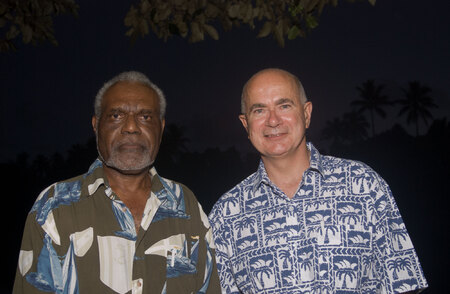[This editorial appeared in today’s Vanuatu Daily Post newspaper.]
The arrest of Vanuatu PM Sato Kilman’s personal secretary at Sydney airport and the subsequent expulsion of all AFP staff from Vanuatu should offer players on both sides of the diplomatic fence the opportunity to reflect and, with luck, learn a little from each other. But that’s probably going to take a while.
Tempers in Vanuatu remain quite heated, and it appears that Australia has yet to figure out how to climb down from the limb it’s on. Indeed, some suggest that Australia has yet to realise it’s on a limb at all.
Obviously, no one involved thought that the diversion of PM Kilman’s party into Australian territory in order to arrest Clarence Marae would have significant repercussions. They wouldn’t have done it if they had. But judging from Foreign Affairs Minister Bob Carr’s statements so far, his government has yet to realise just how important deference and respect are in Melanesia.
It’s tempting to conflate the PM’s employment of a convicted criminal with this remarkable breach of diplomatic protocol. Some online commenters were quick to say that if the PM kept better company he wouldn’t have found himself in this situation in the first place. That may provide a handy little sound bite, but it does nothing to add to our understanding of the issue.
Clarence Marae’s alleged involvement in criminal tax evasion is a legal matter. The public shaming of a head of government is entirely political. Not to put too fine a point on it, one would hope that those in charge of international relations would be able to draw a distinction between the two.
Australia protests constantly that it treats its Pacific neighbours as peers, but its actions don’t seem to bear this out. It has misread events and conditions on the ground in Fiji, PNG and now Vanuatu, and in each case made itself look a great deal clumsier than it should be.
Nearly all of these mistakes can be explained by an implicit assumption that its role as benefactor somehow makes it smarter or better than its island peers. Neither of these is always true, but more importantly, neither of these matters. Equality and respect don’t stem from equal capability or even equal intelligence or skill. In sports, I don’t respect only those teammates who are stronger or better than me.
The same should be true in diplomacy. Would Australian police have used the same tactics to arrest a member of an American, Chinese or Russian delegation, or for that matter, even a Burmese or Albanian diplomatic group? So what, then, could inspire Foreign Affairs to remain silent while just such a plan was hatched for the Vanuatu delegation? It’s unfortunate to have to say this, but it’s hard to imagine any other reason than a misplaced and parochial sense of superiority.
Worse still, Bob Carr’s first reaction was effectively to say, ‘Nice aid programme you have there. Be a shame if something were to happen to it.’ This statement can only lead us to wonder whether AUSAid’s constant protestations that its programme is non-political are entirely true. There should be more to this relationship than aid.
There was a time when this kind of chastisement might have worked, but it’s behind us now. There are any number of countries who would quite happily step into any gap left by a withdrawal of Australian project and budget support. In strategic terms, Australia has as much to lose as Vanuatu if their relationship breaks down.
Still, Bob Carr did leave himself an opening. He admitted that he had not been briefed on the tactics used by the AFP to draw Clarence Marae into Australian jurisdiction. In an interview, he seemed to spontaneously suggest that a distinction could be made between the legality of Marae’s arrest and the treatment of the Prime Minister. He should pursue this further; it might just be the way out.
Kilman has made no effort whatsoever to defend Marae. So if Australia can find its way to see past the arrest, it can perhaps find a way to reconcile with Vanuatu by expressing regret over the PM’s treatment.
Nobody on the Vanuatu side is in a hurry to mend fences. We’re only months away from a general election, and while people here are not at all comfortable with seeing their head of government associating with convicted criminals, there is still a significant portion of society whose sense of national pride has been pricked by these events. Respect and deference are not abstract notions in Melanesia. It may be hard to grasp this if all you know is the law, but Melanesian kastom is predicated on peace first, justice second. In a nutshell, living on an island sometimes requires that we tolerate behaviour that we consider beyond the pale. Surrounded as we are by ocean, we don’t have a pale to go beyond.
It all comes down to this: Australia should take this opportunity to learn a little humility and respect and to try its hand at peace-making, Melanesian-style. If it does find a way to re-engage, it’s just possible that its law enforcement personnel might get the chance to help us – not punish, help – to be a little wiser in choosing the company we keep.

